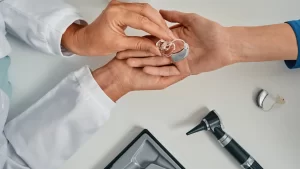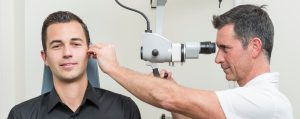SUDDEN HEARING LOSS: WHAT SHOULD YOU DO?

20 March 2020
A medical emergency that should be taken very seriously, it can affect all adults and usually occurs in a single ear. It’s characterized by a sudden and significant degradation of the hearing in less than three days. The right thing to do in case of sudden deafness is to have the disorder properly diagnosed, get a medical checkup, then start the treatment quickly.
Signs of sudden deafness
The first signs of sudden deafness can be felt at the level of the hearing, such as intense noises in the ears similar to tinnitus, but also as a feeling of auditory “fullness,” an early sign of hearing loss. Other external signs – such as dizziness, a feeling of heaviness, headaches, facial paralysis, or skin lesions in the ear – may appear.
This condition can also be encouraged by several risk factors, such as stress and burnout, cochlear circulatory disorders, repeated otitis, diabetes, spinal disorders, tumours, autoimmune diseases, or disturbances in the sensory cells.
Diagnose the disease with a medical checkup
A medical consultation with a doctor or a hearing specialist should be carried out to diagnose and take charge of the sudden deafness as quickly as possible. A complete examination will help determine the causes of the deafness and can in particular help doctors treat the less complex cases. Signs of deafness can sometimes be caused by the presence of a cerumen impaction or a foreign body in the ear canal. By cleaning it, an ENT can restore the patient’s hearing in just a single consultation. In other cases, the signs of deafness can be quickly treated if they’re the result of an ear infection or a lesion on the eardrum caused by the excessive use of a cotton swab.
Receive the appropriate treatment
Corticosteroid therapy
A drug therapy, corticosteroid therapy involves administering cortisone via tablets or injection into the ear for a 7 to 21-day period. Cochlear circulatory disorders such as haemorrhages, thrombosis, embolisms, or spasms of the cochlear artery are recognized by hearing specialists as the most likely causes of sudden and persistent deafness. These can be improved and treated by cortisone, which significantly increases blood circulation in the affected area.
Hyperbaric oxygen therapy
An uncomfortable treatment only used in a few countries, it involves making the patient inhale oxygen while placed in a sealed capsule in which the pressure is higher than in the external atmosphere. This therapy is based on the scientific fact that sudden deafness is caused by a lack of oxygen, which causes damage to the inner ear.
Hearing aids
Used in case of a serious reduction or loss of hearing, a hearing aid is the appropriate treatment in case of sudden deafness that doesn’t fade over time. It’s prescribed by an ENT and provided and adjusted in a personalized way by an audioprosthesist. An electronic device capable of generating and amplifying sounds, it improves almost every hearing impairment. In addition, according to your needs, it can be a device that fits in the contour of the ear, a peritympanic device, a continuously worn device, or an in-the-ear or in-the-canal hearing aid.
Research on how best to treat this disorder is currently underway, since none of these treatments is unanimously approved by specialists. Indeed, since sudden deafness often spontaneously disappears, it’s difficult to determine the success rate of each treatment in order to compare them.
Autres articles
Effortless Solutions for Common Hearing Aid Problems: Your Guide to Quick Fixes
For many people, hearing aids are a game-changer when it comes to managing their hearing health since they provide a…
BENEFITS OF A RECHARGEABLE HEARING AID
TNowadays, some manufacturers offer cutting-edge hearing aids with rechargeable induction batteries. This avoids the need to regularly change batteries and…
SYMPTOMS OF A RUPTURED EARDRUM AND MOVEMENTS TO ADOPT
A ruptured eardrum is very common and may occur for many reasons. How do you recognize it and what should…


